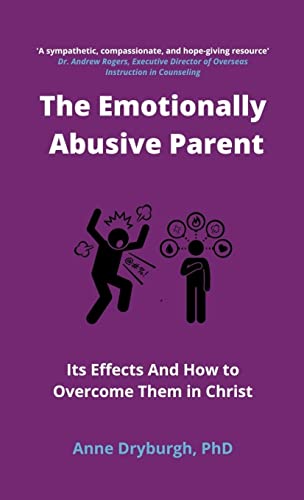The Emotionally Abusive Parent: Its Effects and How to Overcome Them in Christ
What does the bible say about emotional abuse? Dr. Anne Dryburgh has written a tender and God-centered resource for those struggling with emotional abuse from their parents and what God's word ...
Dr. Anne Dryburgh has written a tender and God-centered resource for those struggling with emotional abuse from their parents and what God’s word says about it.
Synopsis:
Dr. Anne Dryburgh begins by defining what emotional abuse is and clearly describes what it looks like in the parent-child relationship. She works through the effects of such abuse on the behavior, actions, thinking, emotions, and relationships. As she works through these effects, she begins to point out and build a framework for biblical truth and hope. With God’s character, she tackles issues such as “where was God when I was being abused?” and “why should I trust God?” She dials into who the individual is in Christ, confronting their own perceptions by working through Ephesians 1. She discusses other struggles such as guilt, shame, anger, and numbness. Lastly, she ends with the reality of evil and sin in this world but the hope in Jesus Christ. He has defeated evil and death (Colossians 1:13-14)!
Score Breakdown:
Treatment of Scripture:
This resource did a good job of referring to biblical texts in their context and even bringing out historical and linguistic observations. I would have loved for her to bring in more scripture in the application and interpretation portions of her book. For example, it would have been great to reference Jesus to show tactics on how to deal with manipulation (Matthew 22:15-22) and how the sinful responses of parents are from their heart and not the child’s fault (Mark 7:15).
Biblical Goals:
From fairly early on Dr. Dryburgh established that the goal of this struggle is to honor and glorify God with one’s responses to emotional abuse. This is must be the starting point and goal of the Christian life (1 Corinthians 10:31).
Biblical Terminology:
For the first half of the book, I would have loved for her to confront the baggage that the term “emotional abuse” carries. I would have liked a mention that emotional abuse is evil and sin, and therefore an abuser is sinning. The abused is one who has been sinned against, yet may have responsibility for their responses. Fleshing out the emotional abuser as one wants to be “god” in another person’s life to have control and receive worship would also be helpful. I would have loved for her to flesh out the fear, people-pleasing, and sensitivity that is experienced as “fear of man” and God’s solutions for these things. Overall, she did a good job of approaching an issue often laden with unbiblical thinking and addressed it well.
Biblical Hope:
Dr. Dryburgh does a great job of having a hope-filled and encouraging book, especially with such a hard topic. I loved how she focused on the character of God for a whole chapter, the believer’s identity in Christ, and the future hope of eternity.
Gospel Concepts:
Dr. Dryburgh clearly outlines the gospel in chapter nine but does it in a tender way which would be very helpful for the hurting individual reading this book. She perhaps could be a tad more clear on the actual sin of the individual, but I understand that it is implied that the person reading this book would most likely struggle with hypersensitivity to their own faults. She takes the gospel and clearly pushes the reader to trust in Christ’s righteousness in a very helpful way.
Practicality and Helpfulness:
This book has great questions for reflection at the end of every chapter which will be very helpful for those reading it. She also includes case studies which are very helpful. Lastly, she includes a few projects and briefly discusses tactics to deal with emotionally abusive parents which are helpful. Ultimately though, it is a 90-page book so there is much more that one could flesh out practically. This book would be best used alongside additional instruction from a Biblical counselor in order to further aid in explaining and applying the concepts.
Discipleship Use:
This little book would be well used in a counseling situation. There is great application and questions at the end of each chapter. It is a great starting point for specific discussion and guidance on implementation with the help of a counselor or discipler. The topic is likely too personal and sensitive for a group setting.
Personal Use:
There are not many books that discuss what the bible says about emotional abuse, but this is a great one. I would recommend this book to those struggling with this topic or who want to understand it. I would give a caveat that it is not exhaustive so it may leave the reader with questions on how this can be applied to their specific parents or past.
Other Thoughts:
Dr. Dryburgh could have gone a step further and talked about the future hope in eternity and the reign of Christ at the very end of the book. It is a large part of the future hope that Christians have (1 Thessalonians 4:16-18). I understand that perhaps it adds theological complications for the reader.


Add a Comment